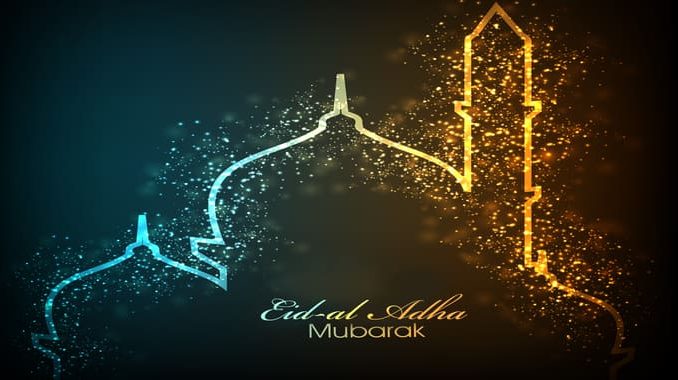
Eid ul-Adha, also known as Eid Qurban, which is a ‘festival of sacrifice’, is one of the biggest Muslim festivals. Every year this important Islamic festival marks the end of the pilgrimage Hajj to the city of Mecca. According to the Quran, ‘those who can make their way’ must definitely take a holy visit to Mecca once in a lifetime. Eid ul Adha is celebrated as the last day of this religious journey and it reminds the followers of Islam of mercy and benefit by Allah on mankind.
It is believed that Ibrahim, also known as Abraham in Christian and Jewish culture, was commanded to sacrifice (sacrifice) to his adult son Ismail. Ibrahim obeyed God and took Ismael to Mount Maurya. As he was offering a sacrifice, an angel stopped him and gave him a ram to perform a ritual instead of his son. However, there are groups who believe that the son of the sacrifice was Ishq.
Since then the event has been celebrated all over the world by various names as Eid ul Adha. In Egypt it is called Eid al-Lahma, and in Saudi Arabia and the Middle East, Eid al-Bakara. Nigerians call it Bada Sallah and Ram Sallah. Kurban Bayarmi is named after it in Turkey and Hari Raya Haji in Malaysia and Singapore.
Observance of tradition and Eid ul Adha
Eid ul Adha is celebrated in the tenth month which is the last month of the Islamic calendar and is continued for the next three days. Like Eid ul Fitr, the ceremony begins with a performance of communal prayer known as dawn on the first day. During Eid ul Adha, families who accept rituals such as goat, camel, sheep, etc., obey Qurbani after donating an equal share to economically backward people and distribute meat among themselves and loved ones Huh. Common practices observed during Eid ul Adha are visiting friends and family and exchanging gifts.
Date and time of Eid ul Ada 2020
Eid ul Adha or Bakra Eid 2020 in India will start from the evening of 30 July 2020 and the celebration will continue till 2 August 2020. Please note that dates may vary.
Read Also: Bakrid / Eid Ul-Adha 2020 – Make Your Eid Special in This Way
Eid ul adha worldwide
Eid ul Adha is a public holiday in many countries including the United Arab Emirates, Jordan, Malaysia, Turkey, Indonesia and India. Read on to know how Eid ul Adha is celebrated around the world:
1. United Arab Emirates
Eid al Adha is celebrated as a four-day public holiday in the UAE. People wear new clothes and after performing sacrificial ceremonies visit friends and relatives and seek blessings from the Almighty. It is quite common to go out for food, shopping and entertainment during these 4 festive days. Preparations are largely done in Dubai by the Dubai Festival and Retail Establishment. Ibn Battuta Mall, City Center Midrit, Mercato Mall, etc. are the most popular places to experience the festival!
2. Pakistan
The festival begins with morning prayers at the mosque, followed by religious sacrifices. The biggest celebration takes place at Faisal Mosque in Islamabad. No Eid celebration is complete in Pakistan without henna and women apply beautiful mehndi designs on their hands. Sheer khurma is cooked in homes and shared with friends and families.
3. Turkey
Qurban Bayram, ie Eid ul Daha is the most prominent festival in Turkey and is celebrated as a 4-5 day public holiday. In the meantime, a sumptuous meal is prepared after the Qurbani and is shared with friends and other loved ones. There are common places for sacrifice in Turkey and rituals can be performed only at these centers. People donate food, clothes, sweets etc. during this time.
4. Egypt
Eid al Adha is marked with a special meal in Egypt and Egyptians start their morning with meat cubes or stir-fried liver for breakfast. Other popular dishes of the festival are Ro’a ‘and lamb cutlets. The locals dress themselves in new clothes and plan family reunions and host feasts. They also feed delicious cooked food to poor or needy people, who are barely able to give it.
5. India
Eid ul Adha is known as Bakrid in India. The celebrations begin at mosques and religious centers, followed by meat distribution among the Qurbani and the economically weak. Fabulous dishes are cooked and shared with loved ones. People wear new clothes and plan trips to mosques and dargahs, followed by community feasts or house parties.
